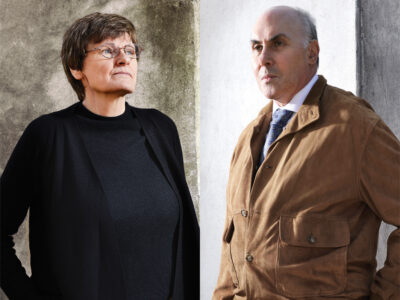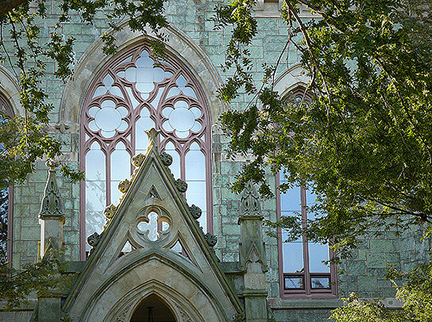
The Trustees Council of Penn Women marked its 25th anniversary with a two-day conference in April that included the screening of an anniversary video, panel discussions, reminiscences from its founders, and the awarding of its highest honor, the Beacon Award, to Nobel Prize-winning author Toni Morrison.
Since its creation at the instigation of then trustee chair Al Shoemaker W’60 Hon’95 in 1987 with the aim of creating an “old girls’ network” [“What Women Wanted,” Jul|Aug 2008], TCPW has had a major positive impact on Penn in areas from women’s sports to faculty diversity to work-life balance issues. As the conference kicked off at the Penn Museum with the award ceremony, outgoing TCPW chair Leslie Myers C’88 highlighted some of the group’s accomplishments.
“We are doers and we lead by example,” Myers said. In addition to advocating for women faculty at Penn and mentoring current students, TCPW’s approximately 200 members have donated nearly $300 million to the University; they count among their number 33 current or past trustees, 89 members of boards of overseers, 38 Alumni Award of Merit winners, and “countless class officers and reunion gift chairs.” The Council has awarded some $500,000 in grants and supported all 14 women varsity sports teams at the University. In 2001, TCPW spearheaded the hugely successful 125th Anniversary Celebration of Women at Penn, and has established annual awards for advancing the role of women in higher education and research at Penn and for excellence in undergraduate advising—and, of course, the Beacon Award.
After students from Kelly Writers House and the Platt Student Performing Arts House had read some of their favorite passages from the writer’s work, Penn President Amy Gutmann presented the award to Morrison, a longtime friend.
“In any struggle for equity, there are heroes,” began Gutmann, herself a past Beacon Award winner [“Gazetteer,” Jan|Feb]. “There are women and men who set their shoulder against the tide of convention and said, Things must change: three wonderful words. And I am honored to stand tonight in a room full of heroes—they are the members of TCPW, past and present, opening new doors for women leaders at Penn and, as a result, for women leaders in our society. They are forward-thinking men like Al Shoemaker, who see areas for progress and change and who, unafraid, take action. And they are visionary writers and thinkers who define something human about us all and defy any limiting definition of what women can and should do. Toni Morrison is a giant among such visionaries.”
Gutmann recalled hosting a 75th birthday party for Morrison at the president’s house, scheduled to follow the Philadelphia premiere of Margaret Garner, an opera for which Morrison had written the libretto. Unfortunately, the event also coincided with “a whiteout blizzard which blew in at night, making the trek from the theater to the party treacherous,” Gutmann said. “It was the kind of weather that brings social functions to a halt—nobody shows up, nobody dares go out—leaving you with overflowing tables and empty seats: a host’s nightmare.
“But weathering storms is a common thread in Toni’s life story,” Gutmann continued. “The birthday party went ahead as scheduled, with everybody showing up. A lively and warm affair it was, even as the storm continued outside our windows.”
More than just weathering life’s storms, Gutmann added, “Toni has made our days sunny by drawing people in—physically in, intellectually in, and emotionally in. Her writing has electrified millions of readers the world over because she presents an irresistible invitation. We cannot help but submerge ourselves in the vivid lives and the epic stories that she imagines, she creates, and then she writes to life.”
Morrison was the first African-American woman to earn the Nobel Prize; before her, there had been only seven women laureates in literature and 12 overall, Gutmann noted. “Toni is a mentor and friend to emerging and established artists and scholars. She has used her influence to support and advance the careers of countless others” and was an “inspiration and a good friend” in Gutmann’s own path to becoming Penn’s president. “Toni spoke the evening before my inauguration. Toni did a reading. Toni was there,” Gutmann recalled, adding that she had also helped celebrate the inauguration of women presidents at Princeton, Harvard, and Brown.
“When you realize the full measure of her life and leadership,” Gutmann continued, “when you read the indelible words that Toni has etched across the history and the future of our culture—even better, when you hear those words, and when you see the ocean of lives that Toni has fundamentally changed, there can be no doubt. Toni Morrison—upon whom Penn was delighted to bestow an honorary degree in 1988—is a true beacon of empowerment and inspiration drawing us all in with the example that she sets.”
The Beacon Award citation, which Gutmann read, praised the power of Morrison’s writing and her personal example, and cited her many awards and honors, which include the Pulitzer Prize as well as the Nobel. (In May, the Presidential Medal of Freedom joined that list.) “In all you do, you blaze new trails. You inspire women worldwide and right here,” Gutmann quoted, and “you truly embody [TCPW’s] 25th anniversary theme, ‘Looking Back, Looking Forward.’”
In her brief remarks, Morrison told of having been asked by an interviewer for an Italian newspaper, “‘Well, at your age’—she didn’t use the word advanced—‘what do you think about your own life? What are your accomplishments? How do you feel about the things you’ve done?’
“And I said, ‘It’s very simple, and it gets simpler and simpler. What you need is vivid and interesting memories, and you need good work … and you need some ibuprofen. Those three things,’” Morrison recounted, to laughter from the audience.
She was “delighted” to receive the Beacon Award in particular, because it “singles out women for leadership positions and nurturing positions and at the forefront of intellectual life.”
She ended with another anecdote, about being invited to Switzerland to deliver a speech to the country’s human rights council. “The letter said, ‘Would you please speak on human rights … and women’s rights,’” she recalled. “So I said, ‘One of these days we won’t be a footnote to human rights. It won’t be human rights, and of course those other things, women’s rights. One day it will be one topic, and we will all be there’ … Welcome to the human race.”
Later in the conference, a panel session with TCPW’s founders mixed warm, often humorous memories of the group’s tumultuous beginnings with reflections on its continuing relevance.
Though they may be more subtle than in the past, gender inequities continue, Al Shoemaker said. “You need to be alert for where you feel that, because you’re a woman, you’re not getting the same attention or direction that a man would.” He pointed to faculty development, particularly in the sciences, as “one of the biggest areas that we need to really continue to focus on.”
Carol Einiger CW’70, TCPW’s first chair, recalled that when the Council was established “we had this idea that it might be only temporary, that we would come up with a list of needs and we’d go through that list … and maybe we’d just get it all fixed,” she said. “I no longer think it’s possible to get it all fixed.”
While lots of progress has been made and many institutional problems have been well addressed, ongoing needs remain, particularly in services to students, she said. “I would suggest that the agenda be driven increasingly by what we hear from the students, because mentoring and career advice, whether one-on-one from all of you or in a more structured group environment, is of such great value.”
Today’s young women certainly enjoy more opportunities in the workplace than earlier generations, “but they have very difficult judgments to make,” Einiger added, “and I think they can benefit so much from programming by the Council that will help them to plan their careers, plan their lives, so that they can be active and engaged and happy throughout their lives.”
In her comments, Judy Berkowitz CW’64, who succeeded Einiger as chair, focused on the “wonderful energetic force within the University” that TCPW has engendered. “We want to become the part of Penn that has its heart, as well as its brain and its soul, and to me we are the essence of that.”
Berkowitz cited Penn’s early admission of women to the University and its recognition of the strength that comes with diversity, acknowledging that “people who haven’t had access before” can contribute to an institution’s success. “We’ve shown that we do make this contribution,” she said, “and I think we should never lose sight of keeping that open soul and heart as part of our Penn tradition.
“We are Penn, Penn is us, and we will carry it forward.”
—J.P.




